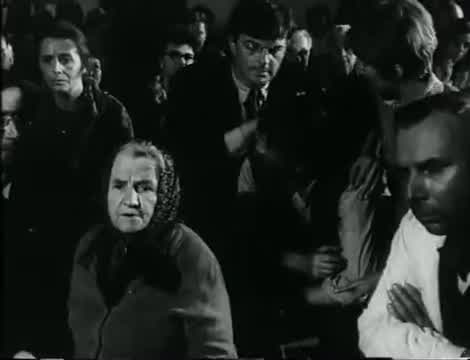Regie:
Evald SchormKamera:
Walter HanuschMusik:
Jan KlusákBesetzung:
Jan Kačer, Bohumil Šmída, Jan Libíček, Květa Fialová, Josef Bek, Bohumil Švarc st., Luba Skořepová, Josef Němeček, Vladimír Jedenáctík (mehr)Inhalte(1)
From a bird's eye view, the camera approaches a little village with its bustle. Village fool Josef gives away his things to his niggardly neighbours. A bus arrives to the village, carrying a group of travelling actors who begin to perform passion plays from the Bible. Editor Alena, lover of one of the actors, Baritone [Baryton], comes to see him. An electricity power failure interrupts the performance. Podgy, spiteful Joker [Srandista] spurs his friends to start spreading news of some kind of imminent danger that no one can escape except inside the wagons that have suddenly turned up at the station. The train dispatcher's wife misses her husband. In the darkness of the night, villagers yield to panic fuelled by the malicious Joker. Some people are bullied by others. A committee is organized, presided over by President [Předseda]. It begins to take decisions on who should be evacuated, since there will not be enough room for everybody in the wagons. That same night, the committee members organize a pig slaughter and, after getting dead drunk, they brutally rape the actress playing Mary. In the meantime, the villagers have boarded the wagons. The local teacher beats to death the train dispatcher with a shovel. Chaos breaks out by the train... Josef the village fool comes to the station. The wagons have dissapeared, and the only sign of the people are the belongings they left behind. A shrill sound accompanies the aerial view of the village with the solitary man. (Verleiher-Text)
(mehr)Kritiken (1)
It's not a five-star movie, because it is too apparent how it was made under difficult conditions and completed hastily so that its production would not be terminated by a ban before it even goes into the vault. On the other hand, it truly deserves four strong and honest stars, because over time, together with Kachyňa's The Ear and Juráček's Case for a Rookie Hangman, it appears to me as the embodiment of intellectual fermentation and social criticism from intellectual positions, and the film simply has a symbolic meaning for that era. It accurately describes a time when implications could still be suggested, but not openly expressed and things could not be called by their proper names. The story of a village whose inhabitants, after the arrival of an acting troupe and some random circumstances such as a power outage and an obstruction on the railway tracks, come to the belief that someone is after them and begin to succumb to mass paranoia. The film is full of impressive and chilling dialogues, and Zdeněk Mahler as a screenwriter used many absurd dialogues that well characterize the dictatorship of real socialism and the madness of the time. Real socialism, as a social system, was extremely susceptible to the spread of various rumors and conspiracy theories due to censorship and concealment of anything, and this pitch-black comedy openly takes shots at it (the term cynical satire would suit this film more than, for example, a psychological drama). Fans of absurd theater and intellectual jokes will probably enjoy the film. Excellent casting and performances. Overall impression: 85%.
()

